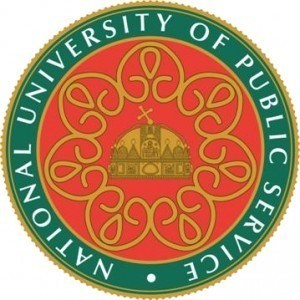Photos of university / #uni.nke
Public Administration Sciences at the National University of Public Service offers a comprehensive education designed to prepare students for leadership roles in public sector organizations. The programme combines theoretical knowledge with practical skills, enabling graduates to effectively analyze, develop, and implement public policies and manage public administration processes. Throughout the course, students will engage with core topics such as governance, public finance, legal frameworks, administrative management, and ethics in public service. The curriculum emphasizes the development of critical thinking, problem-solving abilities, and effective communication skills necessary for successful careers in government, local administration, non-governmental organizations, and international institutions. Students have access to state-of-the-art facilities, internships, and workshops, fostering practical experience and professional networking opportunities. The programme is designed to be interdisciplinary, integrating insights from political science, law, economics, and sociology, to offer a well-rounded perspective on public administration challenges and solutions. Graduates will be equipped to undertake roles that require strategic planning, policy analysis, and organizational leadership, contributing to the development of efficient, transparent, and accountable public institutions. The academically rigorous curriculum is supplemented by experienced faculty members who are experts in their fields, ensuring current and relevant education aligned with the needs of modern public administration. This programme aims to nurture responsible, innovative, and ethical public servants prepared to meet the demands of the 21st century.
The Doctoral School of Public Administration Sciences was established in 2013. Currently, it is the only doctoral school specializing in the field of public administration in Hungary. The aim of the Doctoral School’s program is to provide postgraduate-level education to professionals (researchers and practitioners) working in the field public administration.
The Doctoral School of Public Administration Sciences focuses on 6 areas of research:
- Public Law and Public Administration
- State and Society
- Public Management
- State and Economics
- Public Administration in the International and European Context
- Human Resources
The training of the Doctoral School is available in the following forms:
• organised training
- full-time training (funded by scholarship or individually through tuition fee)
- part-time (funded individually through tuition fee)
- individual training (funded individually through tuition fee)
• individual preparation
The organised training lasts 6 semesters and applies the system of credit points. In order to successfully end their training and receive their leaving certificate (absolutory) by the end of the 6th semester, PhD students must obtain at least 180 credit points in accordance with the following criteria:
- study obligations (min. 59 credits)
- scientific research work (min. 120 credits)
- holding lectures (max. 15 credits)
Upon successful completion of the program, students are awarded a PhD degree in Public Administration Sciences. Besides providing top-quality postgraduate education to our students, the Doctoral School’s mission is to establish a national center of excellence for the research of public administration that meets the highest standards of the international scientific community
(1) Students enrolled in an organised programme may pursue their studies in organised full-time
(funded from scholarship or self-paid) or in organised part-time (self-paid) or in an individual
programme.
13
(2) In an organised PhD programme, the period available for the fulfilment of the obligations set
forth in these Regulations equals up to six semesters, and, in respect of programmes funded from
a scholarship, the scholarship will be disbursed for up to six semesters.
(3) The doctoral schools may permit the interruption of a study period on up to three occasions, for
a total period of three years (leave of absence for an academic year). The interruption of the
student status at one time may exceed two semesters. A student may only interrupt a study
programme after the successful completion of the first semester. An application for suspension
must be accepted on the first occasion. During the suspension of the student status, state
scholarship may not be disbursed.
(4) The student status is also suspended if the student is unable to fulfil his or her obligations arising
from the student status due to childbirth, accident, illness or any other unexpected cause (long-
time study abroad), through no fault of his or her own. The restrictions described in paragraph
(3) do not apply in the cases set forth in this paragraph. The student shall be bound by a
notification requirement also in this case.
(5) With regard to all types of PhD programmes, the meeting of the requirements involving work
time, set as a precondition for obtaining the doctoral pre-degree certificate must be measured in
study points (credits).
(6) An organised programme assists a PhD student in acquiring the knowledge and the individual
research experience required for obtaining a PhD degree. To this end, a PhD student participated
in academic courses, performs individual research activities and may also undertake lecturing
tasks.
(7) A three-year programme consists of six active semesters. Over the course of the programme, at
least 180 credits must be obtained in total. In the period of coursework, a PhD student may take
up, with no additional tuition fees required, subjects of a credit value exceeding the total number
of credit required by 10 per cent. Thus, on completion of the programme, a total of 198 credits
may be recognised on his or her part.
(8) The units of a PhD programme, the minimum and expected number of credits that may be
obtained in each module, the academic requirements and those relating to scientific research
work and lecturing must be set forth in the academic and examination regulations of doctoral
schools (DS AER).
(9) Rules relating to concurrent programmes and foreign studies must be set forth in the academic
and examination regulations of doctoral schools.
(10) The rules relating to the recognition and accounting of credits obtained by a student enrolled in a
PhD programme for subjects taken in the doctoral school of another faculty or institute must be
set forth in the academic and examination regulations of doctoral schools. With regard to credit
recognition, the provisions of the Diploma and Credit Recognition Regulations of the University
must be also applied.
(11) The planning and reporting obligations of a PhD student and his or her supervisor, the scheme of
testing the knowledge of a PhD student and the order of examination period must be set forth in
the academic and examination regulations of doctoral schools, in accordance with the university
rules.
(12) Each PhD student, with the exception of those individually preparing for the degree, shall
possess a statement of acceptance issued by the department that gives lectures and performs
research in the given research subject, signed by the head of the given department.
The financing of the Public Administration Sciences degree programme at the National University of Public Service is primarily supported through a combination of government funding, EU grants, and student tuition fees. As a Hungarian public institution dedicated to training future public servants, the university's funding structure reflects its strategic role in the development of public administration and the civil service. The Hungarian government allocates a significant portion of the funds necessary for the operation of the programme, including faculty salaries, administrative costs, and infrastructure maintenance, ensuring that educational activities meet national standards for public sector education. Additionally, the university actively participates in European Union funded projects, which provide supplementary financial resources for research, curriculum development, and international cooperation initiatives. These EU grants often focus on themes like public governance, digital transformation, and European integration, aligning with the programme’s educational objectives. Tuition fees contribute to the ongoing costs of delivering the programme, with fee structures tailored to domestic and international students. For Hungarian students, tuition is subsidized by the Hungarian state, making the programme more accessible and promoting the training of qualified public administration professionals within Hungary. International students may pay higher fees, which are set to cover additional costs associated with their enrollment. The university also offers various scholarship opportunities, including government-sponsored scholarships, Erasmus+ mobility grants, and institutional scholarships, aimed at supporting talented students financially and encouraging mobility and exchange within the European Higher Education Area. The financial management of the programme emphasizes transparency and accountability, with detailed budgets and regular audits ensuring the efficient use of available resources. Funding strategies are designed to enhance the quality of education, foster research, and support international cooperation, reflecting the university’s mission to prepare competent public administration professionals capable of addressing contemporary challenges in the public sector.
The Public Administration Sciences program at the National University of Public Service is designed to prepare students for leadership and management roles within public sector organizations. The curriculum emphasizes the development of analytical, organizational, and communication skills necessary for effective governance and public service. It covers a broad range of topics including public policy analysis, administrative law, financial management, strategic planning, and public sector ethics. The program aims to equip students with a comprehensive understanding of the institutional frameworks and operational processes of government bodies, non-governmental organizations, and international institutions. Students have the opportunity to engage in practical training and internships, gaining real-world experience in governmental offices, NGOs, and related organizations. Courses are often delivered by experienced faculty members with backgrounds in public administration, politics, and law, ensuring that students receive up-to-date and policy-relevant education. The program also emphasizes critical thinking, problem-solving, and leadership skills to prepare graduates for complex challenges in the public sector. Upon completion, graduates are qualified to work in various roles such as policy advisors, administrative managers, public affairs specialists, and other key positions in governmental and non-governmental organizations. The university fosters an environment of international cooperation, encouraging students to participate in exchange programs and seminars. Through this education, students become well-versed in ethical standards and innovative practices necessary for enhancing public administration efficiency and transparency. The program is dedicated to fostering a sense of civic responsibility and commitment to public service, making its graduates valuable assets to the community and the country.

